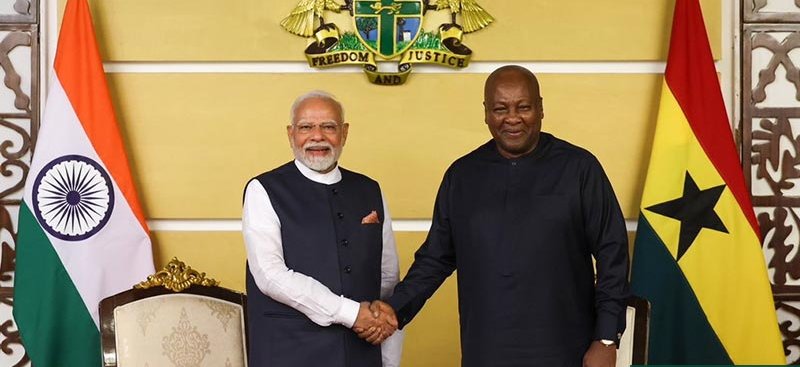In a historic diplomatic move, Indian Prime Minister Narendra Modi became the first Indian leader in over 30 years to visit Ghana, marking a significant milestone in the evolving relationship between India and Africa. Modi’s visit to Accra, the capital of Ghana, was not only a celebration of growing bilateral ties but also a symbolic gesture of India’s increasing engagement with the African continent, especially within the context of the Global South. His warm reception — which included a ceremonial guard of honor, a 21-gun salute, and cultural performances — reflected mutual respect between the two nations and high hopes for what this renewed partnership could achieve.

Upon arriving at Kotoka International Airport in Accra, Modi was greeted with full state honors, emphasizing how much Ghana values India as a strategic partner. President John Dramani Mahama hosted the Indian leader with both diplomatic courtesy and cultural flair, as traditional drummers and lively performers dressed in kente set the tone for an event rooted in policy and cultural appreciation. This visit, taking place amidst rising geopolitical shifts, highlights India’s aim to play a more prominent role in Africa, not just as a trading partner but as a co-creator of modern African societies.
During his official discussions with President Mahama at Jubilee House, the two leaders signed a series of important memoranda of understanding (MoUs) that advanced Indo-Ghanaian relations into a comprehensive partnership. These agreements covered various sectors, including digital fintech integration, vocational training, public healthcare, goods standardization, traditional medicine, and diplomatic consultation mechanisms.

One of the main highlights was Ghana’s agreement to adopt India’s innovative Unified Payments Interface (UPI), a technology that has transformed digital payments and financial inclusion in India. This not only showcases India’s soft power through technology but also supports Ghana’s goal of becoming a regional digital leader in West Africa.
Prime Minister Modi also announced the opening of a Jan Aushadhi store in Accra, which will offer affordable generic medicines — a key part of India’s pro-poor healthcare strategy. More investments are planned for skill development and vocational training centers in Ghana, supporting local capacity-building in line with Ghana’s development goals. These initiatives are not just one-sided giveaways but collaborative efforts that empower Ghanaians and create new opportunities for Indian businesses and organizations to work together across borders.
Symbolically, Modi received Ghana’s highest civilian honor, the Officer of the Order of the Star of Ghana, in recognition of his leadership and efforts to strengthen ties between the two countries. In his acceptance speech, he humbly dedicated the honor to the youth of both nations and stressed that India approaches Africa with a genuine, non-colonial, and non-exploitative mindset. He reaffirmed that India and Ghana are united by their commitment to democracy, cultural diversity, and the growth of emerging economies. He also highlighted that the Global South must address its issues through solidarity and mutual dialogue, not through imposition or dependence.
Hinduism has experienced steady and peaceful growth in Ghana, actively supported by the African Hindu Monastery (AHM) led by Swami Ghananand Saraswati and the International Society for Krishna Consciousness (ISKCON), also known as the Hare Krishnas. Other spiritual groups, including the Sathya Sai Organization, Ananda Marga, and the Brahma Kumaris, are also active throughout the country.

Several Hindu temples have been built in the capital, Accra, serving both the Indian community and native Ghanaian Hindus. By 2021, around 30,000 Hindus lived in Ghana, making up about 0.1% of the population. Notably, Ghana is one of only three countries outside Asia—along with Russia and Ukraine—where Hindus are indigenous rather than descendants of Indian immigrants. Swami Ghananand Saraswati has played a key role in establishing five temples across Ghana, which have become the primary spiritual and cultural centers for Hindu practice in the country. This largely highlights a reaffirmation of India’s civilizational values, recognizing that India’s most valuable export has always been its ideas, not military power.
In the broader geopolitical landscape, Modi’s visit to Ghana is part of a larger five-nation tour that includes Trinidad and Tobago, Argentina, Brazil, and Namibia, ending with the BRICS Summit in Brazil. His presence in Ghana sends a strong message to both allies and rivals: India is not a passive observer in shaping Africa’s future but an active partner providing technology, knowledge, and ethical leadership. At a time when African countries are increasingly seeking alternatives to Chinese loans and Western solutions, India’s approach — rooted in partnership, not patronage — is seen as both refreshing and reliable.
Furthermore, Modi’s emphasis on multilateral cooperation, reforms in global institutions like the United Nations, and shared responsibilities in counterterrorism and maritime security resonated with Ghanaian leaders. As a member of both the African Union and ECOWAS, Ghana plays a vital role in regional peacekeeping and development, making it a key partner in India’s Africa strategy.
In conclusion, Prime Minister Narendra Modi’s visit to Ghana was more than just a symbolic homecoming or diplomatic milestone — it marked the beginning of a new chapter in India-Africa relations. By combining economic cooperation, cultural diplomacy, technological transfer, and spiritual exchange, Modi reaffirmed India’s role in Africa’s future. His meeting with the Indian diaspora rekindled emotional and family bonds that have long connected the two nations. At the same time, his recognition of Ghanaian Hindus highlighted a unique and growing chapter in Africa’s spiritual journey.
As India continues to rise on the global stage, it does so with humility, cultural wisdom, and a commitment to shared prosperity. The reception Modi received in Ghana proves not just his personal popularity but also the lasting appeal of India’s message — one of peace, cooperation, and mutual respect. The seeds planted during this visit are likely to produce benefits for generations, creating a legacy of friendship and progress between two of the world’s most vibrant democracies.





